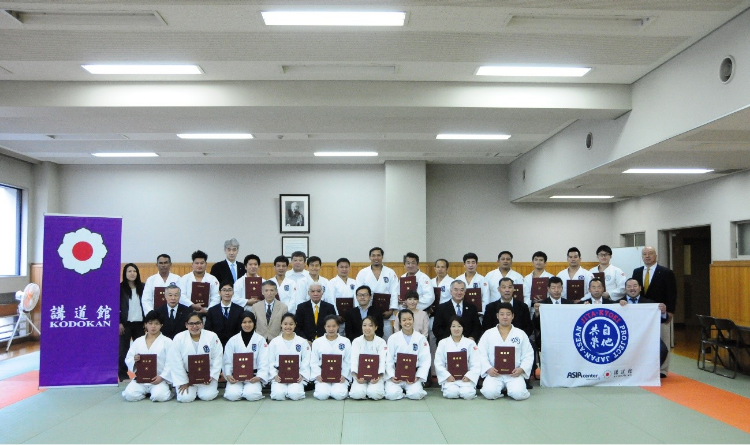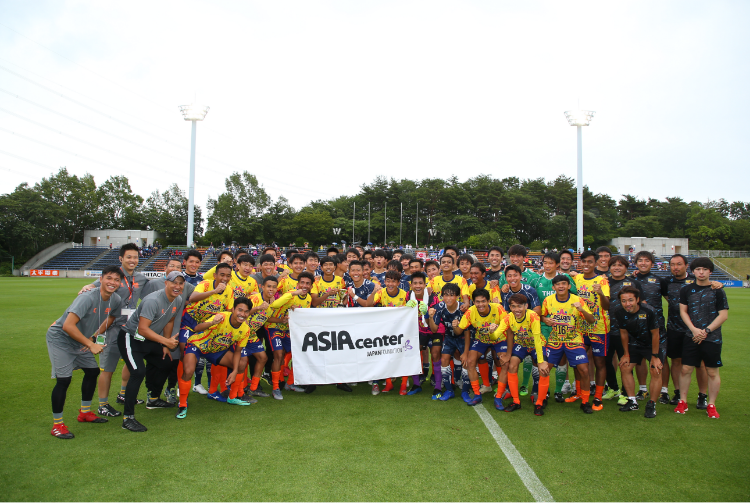2022.10.12
DIALOGUE“Learning from One Another and Growing Stronger Together”
Bonds with Asia Nurtured through Sports

The photo is from when coaches of Giravanz Kitakyushu were dispatched to Cambodia for a short period of time. Photo courtesy of Giravanz Kitakyushu
The Japan Foundation (JF) has been engaged in sports exchange projects since its establishment. Here, we would like to introduce several unique projects that JF has implemented involving judo and football in Asia in recent years.
Through sports, one can easily interact with people from all over the world without relying on words. Since its inception, JF has been dispatching experts in sports such as judo, wrestling, gymnastics, volleyball, karate, etc., to Southeast Asia, Africa, the Middle East, and other areas. From 1977 to 2001, JF organized short overseas tours for large sports teams made up of around 20 members, primarily to compete in friendly matches. In 1981, JF launched a special project to promote interchange with the countries of the Middle East through sports. This project involved the long-term dispatch of instructors, as well as the dispatch of delegations for kendo, aikido, football, etc., over a period of five years.
We would now like to introduce two unique judo and football projects, which follow from these past achievements, that JF has implemented recently in Asia.
Judo: Linking Japan and ASEAN through the Principle of Mutual Welfare and Benefit
First, the judo-based “JAPAN-ASEAN JITA-KYOEI PROJECT” was jointly implemented by the JF Asia Center and the Kodokan Judo Institute for six years from 2016. It was based on the principle of “JITA-KYOEI” (mutual welfare and benefit) advocated by the founder of judo, KANO Jigoro Shihan—“Achieving a state of mutual trust and assistance benefits both the individual and society at large.” “Mutual welfare and benefit” is a philosophy that is closely linked with the Asia Center’s mission of “nurturing a spirit of empathy and coexistence among Asian people.” The aim of this project was to promote cultural exchange and mutual understanding between Japan and Southeast Asia through judo.

As part of the JAPAN-ASEAN JITA-KYOEI PROJECT, young coaches from throughout ASEAN who will lead judo programs in their respective countries were invited to the Kodokan Judo Institute to participate in international seminars where they were taught correct theories and techniques. The participants were awarded certificates of completion at the closing ceremony. Photo courtesy of the Kodokan Judo Institute
Mr. OTSUJI Hirofumi, manager of the International Department of the Kodokan Judo Institute in charge of this project, recalls: “We really focused on developing instructors in each country who will go on to teach and spread judo throughout Asia, especially in ASEAN countries. The idea of the project was to develop instructors who will lead judo in each country and to use this scheme as a starting point to educate and enlighten judoka, coaches and referees.”
In addition to dispatching judo instructors from Japan to various countries, young coaches from each country were also invited to participate in training camps held at the Kodokan Judo Institute. In between judo instruction, the participants had the chance to experience facets of Japanese culture such as calligraphy. Furthermore, this project included exchanges with presidents of several national judo federations and the creation of educational videos for instructors. This was not a one-way project; the teachers also learned from the experience, Mr. Otsuji recalls. “We are constantly learning as we pass on our knowledge and skills with enthusiasm. I couldn’t be happier that the Kodokan Judo Institute is working with the Japan Foundation to contribute to the advancement of judo in Asia and elsewhere as a bridge between Japan and the rest of the world.”

Judo instructors were dispatched to Bhutan as part of the project. This led to the Bhutan Judo Association joining the International Judo Federation in 2016. Photo courtesy of the Kodokan Judo Institute
Football: Seeds of Goodwill Sown by “ASIAN ELEVEN”
The other project is “ASIAN ELEVEN,” a football exchange with Southeast Asia that has been jointly implemented by the JF Asia Center, the Japan Football Association (JFA) and the Japan Professional Football League (J.League) since 2014. This project is part of “Sport for Tomorrow,” an international contribution and exchange project promoted by Japan through public-private partnerships in its role as the host country of the Tokyo 2020 Olympic and Paralympic Games. The aim of ASIAN ELEVEN is to share the knowledge and experience cultivated by Japanese football while also building good rivalries and friendship with Southeast Asian countries through football. It has also focused on dispatching coaches and developing players with the aim of elevating the level of “Asian football.”
FIFA/AFC Instructor and JFA Deputy Technical Director ONO Takeshi explains, “Over the past 30 years or so, Japanese football has grown rapidly and Japan is now able to compete on an equal footing with many of the world’s powerhouses. The Southeast Asian countries who have witnessed the rise of football in Japan have high expectations for this project, thinking, ‘we’re next!’ Coaching in these countries goes beyond merely elevating the level of football; it is also necessary to consider how to develop players and build a training system, in environments with different cultures and customs. The coaches also have lots to gain, as the opportunity to coach in such an environment is not available in Japan. Bringing home the experience from coaching overseas will also improve the level of Japanese football.”

As part of the ASIAN ELEVEN Project, coaches and staff are dispatched from Japan either on a long-term or short-term basis. Kawasaki Frontale coaches visited Vietnam between 2015 and 2019 on short-term dispatches organized by JF, which culminated in the opening of the first J.League Club football school in Vietnam in 2021. Photo: Kisshomaru Shimamura
Of course, there are language and cultural barriers. Mr. OHARA Kazunori, Technical Director of the Football Federation of Cambodia, who is responsible for the development of the local youth teams and their coaches, explains, “Even before talking about football, creating an atmosphere of open communication within the organization can be difficult. That said, we should not simply impose the Japanese way of doing things. It is important to understand others and to feel that you are also growing through this learning process and are happy with it. I believe that this will lead to international exchange in the truest sense.”

Football Federation of Cambodia Technical Director OHARA Kazunori (pictured second from the left). Mr. Ohara has a wealth of coaching experience and is a former coach of the Bhutan national team. He is mainly responsible for management operations in Cambodia while also launching football academies in 25 provinces in Cambodia and developing training plans for coaches. Photo: ©JFA/PR
Meanwhile, top football players and young executives of football federations from various countries are also invited to Japan, which is useful not only for improving skills but also for person-to-person exchanges. Mr. Ono of JFA explains, “During their stay, we provide them with opportunities to learn about Japanese culture. As the participants are carefully selected top young players and executive candidates, they will play central roles in promoting the development of football in their country after they return home. And if they are able to make connections, this will facilitate smoother communication because there will be many opportunities to meet again face to face at international matches in the future. So, the ‘bonds’ that have been forged by learning together will live on in various ways.”
What these two projects have in common is that neither is focused solely on improving skills in sports. As they both target young people, they highlight the importance of opportunities to encounter Japanese culture and have educational value in terms of “courtesy” and “interaction with the local community.” What is born through international exchange is not victory or defeat. Together we all gain new friendships and new bonds, because the appeal of sports is the chance to learn from each other and grow together. JF will continue to help build bridges to the rest of the world through sports.

In 2019, the ASIAN ELEVEN Project held a friendly match “JapaFunCup” at J-Village Stadium in Fukushima. A team transcending national borders made up of U-18 players from each country that took part in this project claimed a splendid victory over a Tohoku U-18 team. Photo: ©JFA
